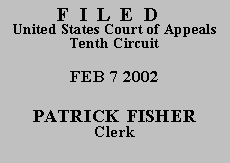

| RICKY TYREE, |
|
On appeal, Mr. Tyree argues that § 2254 remedies are inadequate or ineffective,(1) in part because of the one-year limitation period, but that same limitation period applies to habeas claims under § 2241 See 28 U.S.C. § 2244(d)(1). Moreover, § 2241 may not be used to evade the requirements of § 2254. See, e.g., Greenawalt v. Stewart, 105 F.3d 1287, 1287 (9th Cir. 1997) (§ 2241 could not be used to evade the limitation on second or successive § 2254 petitions). As a general rule, challenges to the fact or duration of imprisonment are cognizable under 28 U.S.C. § 2254. Preiser v. Rodriguez, 411 U.S. 475, 500 (1973). Federal claims concerning the conditions of confinement are more properly brought pursuant to 42 U.S.C. § 1983, not 28 U.S.C. § 2241. Rael v. Williams, 223 F.3d 1153, 1154 (10th Cir. 2000), cert. denied, 531 U.S. 1083 (2001).
A district court has power to dismiss a case with prejudice for failure to prosecute or failure to comply with a court order. See Fed. R. Civ. P. 41(b). We believe the substance of the dismissal in this case, however, was a failure to allege claims cognizable under § 2241. See Trujillo v. Colorado, 649 F.2d 823, 825 (10th Cir. 1981) (citing Mann v. Merrill Lynch, Pierce, Fenner & Smith, 488 F.2d 75, 76 (5th Cir. 1973) (per curiam) ("Since the original action was dismissed basically because requisite jurisdictional allegations were missing, and not because Mann disobeyed the Court, that dismissal does not operate as an adjudication upon the merits.")). Accordingly, we interpret the dismissal as one with prejudice insofar as the § 2241 jurisdictional issue, but without prejudice as to the other claims raised in the petition for which there was no ruling on the merits. See Pack v. Yusuff, 218 F.3d 448, 454 (5th Cir. 2000); Rael, 223 F.3d at 1154-55.
So interpreted, we conclude that Mr. Tyree has failed to make "a substantial showing of the denial of a constitutional right," 28 U.S.C.
§ 2253(c)(2), Slack v. McDaniel, 529 U.S. 473, 483-84 (2000). We DENY Mr. Tyree a certificate of appealability ("COA") and DISMISS the appeal.
Entered for the Court
Paul J. Kelly, Jr.
Circuit Judge
*. This order and judgment is not binding precedent, except under the doctrines of law of the case, res judicata, and collateral estoppel. This court generally disfavors the citation of orders and judgments; nevertheless, an order and judgment may be cited under the terms and conditions of 10th Cir. R. 36.3.
2. After examining the briefs and the appellate record, this three-judge panel has determined unanimously that oral argument would not be of material assistance in the determination of this appeal. See Fed. R. App. P. 34(a); 10th Cir. R. 34.1(G). The cause is therefore ordered submitted without oral argument.
1. The "inadequate or ineffective" requirement comes from 28 U.S.C. § 2255. See Caravalho v. Pugh, 177 F.3d 1177, 1178 (10th Cir. 1999).